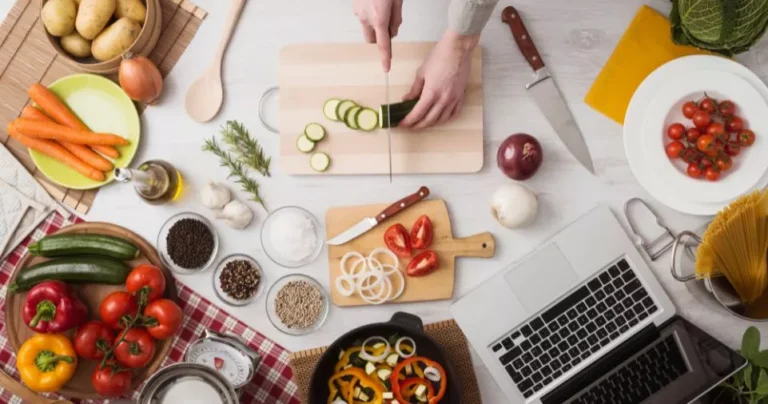Being a student often means navigating a whirlwind of responsibilities, and mastering the art of cooking is a crucial skill that can make college life both healthier and more enjoyable. In this guide, we’ll explore cooking basics tailored specifically for students, ensuring that whipping up a delicious and nutritious meal becomes a manageable task for them and they can create cooking skills easily.
What are best ways to learn cooking?

Whether you’re a novice in the kitchen or looking to enhance your culinary skills, learning to cook can be a rewarding journey. Here are some effective and practical ways to become proficient in the art of cooking:
Online Cooking Classes
Engage in online cooking classes offered by reputable platforms. These classes often cater to various skill levels and cover a range of cuisines. Follow along with experienced chefs, learn techniques, and access a plethora of recipes to hone your skills.
Cooking Apps and Websites
Utilize cooking apps and websites that provide step-by-step recipes, cooking tips, and video tutorials. Many platforms offer interactive features, allowing you to connect with a community of fellow cooking enthusiasts, share experiences, and seek advice.
Cookbooks and Recipe Blogs
Invest in beginner-friendly cookbooks or explore recipe blogs that break down cooking processes into manageable steps. Start with simple recipes and gradually progress to more complex ones as you gain confidence in the kitchen.
Cooking Classes or Workshops
Attend local cooking classes or workshops in your community. Many community centers, culinary schools, or even specialty stores offer hands-on sessions that allow you to learn in a supportive environment while receiving real-time guidance from experienced instructors.
Practice Regularly
The adage “practice makes perfect” holds true in cooking. Dedicate regular time to experiment with different ingredients, techniques, and recipes. The more you cook, the more comfortable and proficient you’ll become.
Learn from Family and Friends
Tap into the culinary knowledge within your own circle. Cooking with family members or friends who are skilled in the kitchen can provide valuable insights, tips, and personalized guidance.
Watch Cooking Shows
Watch cooking shows on television or online platforms. Many shows feature professional chefs demonstrating techniques and sharing their expertise. Observing their methods can inspire and educate, making you more comfortable in the kitchen.
Join Cooking Communities
Engage with online cooking communities or forums where individuals share experiences, ask questions, and exchange tips. Participating in these communities can provide a sense of camaraderie and open avenues for learning from others.
Culinary Work Experience
Consider gaining hands-on experience by working in a restaurant or kitchen. While this might be a more immersive option, it allows you to observe professional chefs, learn kitchen dynamics, and acquire practical skills on the job.
Be Open to Mistakes
Finally, embrace the learning process, and don’t be afraid to make mistakes. Cooking is a skill that develops over time, and every misstep is an opportunity to learn and improve.
How to create cooking confidence?

Cooking can seem intimidating, especially if you’re just starting. However, with a gradual approach and a positive mindset, you can build confidence in the kitchen. Here’s a step-by-step guide to help you create cooking confidence:
Start with Simple Recipes:
Begin your culinary journey with straightforward recipes that require minimal ingredients and steps. Mastering the basics lays a solid foundation for more complex dishes later on.
Gather the Right Tools:
Having the right kitchen tools at your disposal can make the cooking process more enjoyable and efficient. Invest in quality knives, pots, pans, and utensils to set yourself up for success.
Learn Basic Techniques:
Focus on mastering fundamental cooking techniques like chopping, sautéing, boiling, and baking. Understanding these basics builds your confidence and allows you to approach a variety of recipes with ease.
Take Small Steps:
Don’t overwhelm yourself by attempting intricate recipes right away. Gradually increase the complexity of your dishes as you become more comfortable in the kitchen.
Embrace Mistakes as Learning Opportunities:
View mistakes as part of the learning process. Everyone encounters culinary mishaps, and they often lead to valuable insights that contribute to your growth as a cook.
Celebrate Small Wins:
Acknowledge and celebrate your successes, no matter how small. Whether it’s perfectly cooking rice or mastering a new cutting technique, each achievement boosts your confidence.
Experiment with Flavors:
Explore different herbs, spices, and seasonings to understand flavor profiles. Experimenting with ingredients enhances your understanding of taste and allows you to personalize recipes.
Plan and Prep:
Take the time to plan your meals and prep ingredients in advance. Having a clear plan and organized workspace reduces stress and boosts your confidence during the cooking process.
Follow Recipes but Add Your Twist:
Start by following recipes closely, but don’t hesitate to add your own flair. As you become more confident, you can modify recipes based on your preferences and creativity.
Cook Regularly:
Consistency is key. The more you cook, the more comfortable you become in the kitchen. Make cooking a regular part of your routine to reinforce your skills and confidence.
Seek Guidance:
Don’t hesitate to ask for advice or seek guidance from experienced cooks. Whether it’s friends, family, or online communities, learning from others can provide valuable insights and encouragement.
Trust Your Instincts:
Develop confidence in your ability to make decisions in the kitchen. Trust your instincts when adjusting flavors, experimenting with ingredients, and adapting recipes to suit your taste.
Essential Kitchen Tools

One of the first steps in becoming a proficient cook is equipping yourself with the right kitchen tools. Invest in fundamental kitchen items such as a cutting board, a good knife, a set of pots and pans, measuring cups, and utensils. These essentials will lay the foundation for your culinary adventures.
Basic Cooking Techniques

Understanding basic cooking techniques forms the backbone of any good recipe. Start by mastering the art of chopping, dicing, and slicing. Sauteing, boiling, and baking are also fundamental skills that will open up a world of recipe possibilities.
Staple Ingredients Every Student Should Have

Stocking your pantry with essential ingredients for cooking ensures you’re always ready to create a meal. Keep basics like rice, pasta, canned beans, olive oil, spices, and a variety of sauces on hand. These versatile ingredients can be combined in countless ways to create satisfying and flavorful dishes.
Meal Planning for Success

Effective meal planning is a game-changer for busy students. Allocate some time each week to plan your meals, considering your schedule and nutritional needs. This not only saves time and money but also helps you make healthier choices for different food types.
Quick and Easy Recipes

As a student, time is often of the essence. Explore quick and easy recipes that require minimal ingredients and preparation. One-pot dishes, stir-fries, and sheet pan meals are excellent options for those with a tight schedule.
Budget-Friendly Tips
Heading to the grocery store with a plan and a budget in mind can significantly impact your overall spending. Look for sales, buy in bulk when possible, and consider frozen or canned options for items that won’t compromise taste or nutrition.
Cooking as a Stress-Reliever
While mastering cooking basics is practical, it’s also worth noting the therapeutic benefits of cooking. Taking time to prepare a meal can be a welcome break from academic stress. Experiment with new recipes, and allow the kitchen to become a creative outlet.
Conclusion
Mastering cooking basics as a student is not just about survival; it’s about thriving. Armed with essential skills, a well-stocked kitchen, and a bit of planning, students can transform their culinary experience. Cooking becomes not just a necessity but an enjoyable and rewarding aspect of daily life. So, embrace the kitchen, experiment with flavors, and savor the satisfaction of creating your own delicious and nutritious meals.







